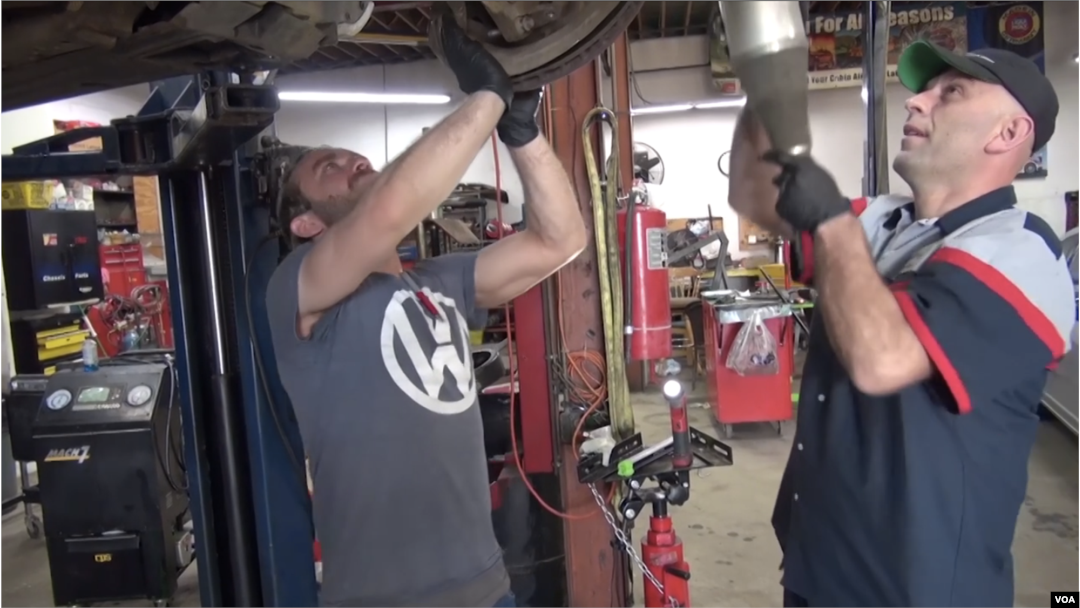In 2014, a stranded motorist left a glowing review for Larry’s Auto and Truck Repair, located on the outskirts of Charlottesville, Virginia.
“I am in the midst of hauling my horse cross country from Northern Virginia to Denver Colorado, and as I was heading onto I64W my truck broke down…” wrote Ariel L. from Castle Rock, Colorado, on the Yelp business review website after ending up at Larry’s Auto and Truck Repair.
“The man was literally waiting for me like a surgeon expecting a seriously ill patient being transported to the hospital. I'm not exaggerating when I say he took the keys from me, said to make myself comfortable…”
The man was Yasha Ismailov, 35, whose family owns Larry’s. He is a passionate fixer of vehicles.
“We can fix any car,” he says, “So it happens a lot of times when nobody can fix it in town, they send it here.”

Refugee Yasha Ismailov, 35, owns two business, including an auto repair shop, in Charlottesville, Virginia. (J. Soh/VOA)
It is not just that his name is Yasha instead of Larry, Ismailov is an unlikely businessman in Charlottesville. He came a long way to get here.
Long journey
A Meskhetian Turk, Ismailov was born in Uzbekistan.
Meskthetians are an ethnic subgroup of Turks that were deported in rail cars from their homeland by the leader of the Soviet Union Joseph Stalin during World War II. Most of them were left in Uzbekistan.
Ismailov was not in Uzbekistan long. “My family had to flee to Russia because there was a massacre in Uzbekistan of Turks … in 1989,” he explains. Ismailov was seven.
But Russia was no more hospitable. Meskhetian Turks were barred from citizenship, property ownership and jobs.
When the U.S. began accepting Meskhetian Turks as refugees in 2004, the family came to Charlottesville. By then, Ismailov was 22. All he, his parents and his brother brought with them were suitcases of clothes.
‘We felt safe’
Charlottesville, a small city about 190 kilometers south of Washington DC, is known to welcome refugees. More than 3,000 refugees, including Ismailov, have re-started their lives here since the late 1990s with the help of the resettlement agency, the International Rescue Committee (IRC).
"[The IRC] told me it was a nice place, good and ‘You will like it, so go there,’” says Ismailov. “We felt free. We felt better than over there. We felt safe.”
Now married to a fellow refugee, Yasha Ismailov has two children and owns his own home. (J. Soh/VOA)
What followed was hard work.
“We were working so hard [the] first three years before we started [the] business. We were working four people, sometimes working double jobs,” he says.
Ismailov worked as a painter, an air conditioner installer and something he learned in Russia.
“My third job was electric," he says. "I love electric stuff.”
And then the family bought the auto repair shop from original owner, Larry.
Harriet Kuhr, director of IRC’s Charlottesville Office says Charlottesville has jobs and opportunity to offer refugees.
“It really adds a lot of diversity, but it also adds economic impact," says Kuhr. "So the refugees are not takers. They're giving back by helping the community grow economically.”
Proud to contribute
Ismailov’s shop now has seven employees and repairs about 150 cars a month. He has opened another family business called Downtown Auto Sales, a used car dealership.
Ismailov is a U.S. citizen now and owns his house. He's married to another refugee and has two children. His life in Charlottesville looks very good to him.
“I have nice neighbors. I have a job. Nobody bothers me,” he says. “I am proud to be able to contribute to the community in Charlottesville.”
Now he is looking beyond the hard work to the future. His eight-year-old daughter is an accomplished swimmer and he hopes “one day she wins an Olympic medal for the United States."
He also looks beyond Charlottesville to the large number of refugees around the world who have not been as fortunate as he has.
"I am lucky I am here, but they are not,” he says sadly. “I feel sorry about them. I'd like to help them with something if I can."

